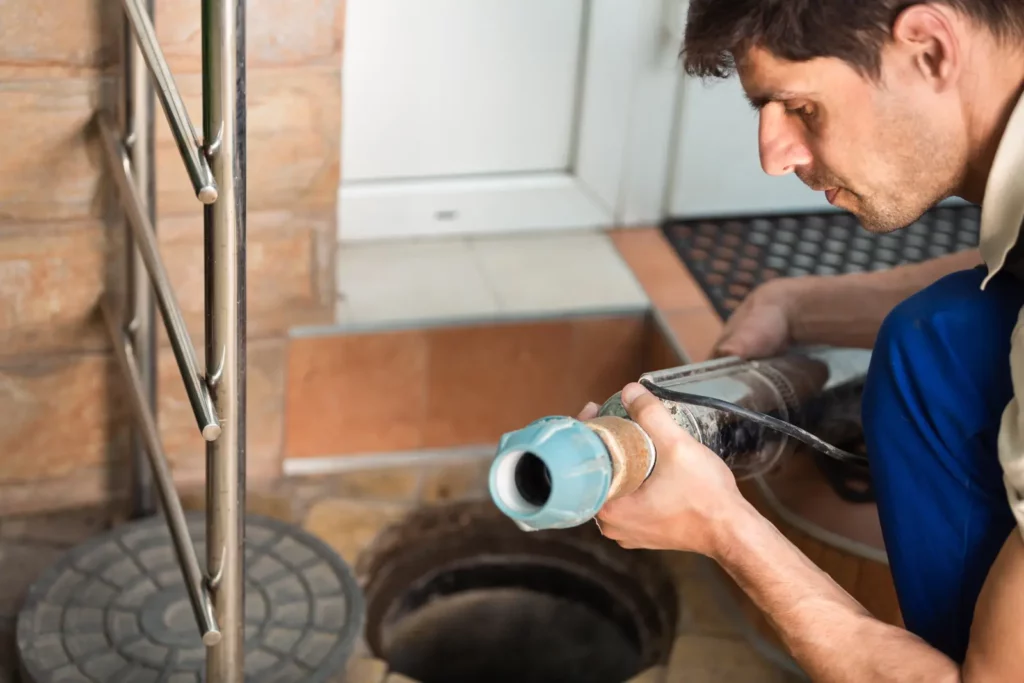Safeguarding your drains from clogs and backups can be a smart and sensible solution. But where do you start? What are the best preventative drain maintenance measures to ensure smooth flow and uninterrupted drainage?
By taking a few simple steps, you can ward off potential plumbing problems and keep your drains in top-notch condition. So, what are these measures? Stay tuned to find out how you can maintain the health of your drains and avoid costly repairs down the line.
Key Takeaways
- Regular drain cleaning and maintenance are essential to prevent clogs and blockages, improve drainage, and reduce the risk of backups.
- Proper waste disposal, including separating waste for recycling, composting, and general trash, and responsibly disposing of cooking grease, helps preserve drain functionality and has a positive environmental impact.
- The use of drain screens or strainers can effectively catch hair, food particles, and debris, preventing clogs and expensive repairs.
- Regular plumbing inspections are crucial for identifying potential plumbing issues early on, preventing further damage and costly repairs, and extending the lifespan of drains.
Regular Drain Cleaning
To keep your drains running smoothly, regularly clean them using simple maintenance techniques. Regular drain cleaning offers a range of benefits that can enhance your sense of belonging in a well-functioning household. By taking the time to clean your drains, you can prevent clogs and blockages from occurring, ensuring that water and waste flow freely through the pipes.
One of the main benefits of regular drain cleaning is the prevention of clogs. Over time, debris such as hair, soap scum, and food particles can accumulate in your drains, leading to blockages. By cleaning your drains on a regular basis, you can remove this buildup and prevent clogs from forming. This won’t only save you from the frustration of dealing with a clogged drain but also save you money on potential repairs.
Another benefit of regular drain cleaning is improved overall drainage. When your drains are clean and free of debris, water, and waste can flow smoothly through the pipes. This means that your sinks, showers, and toilets will drain more efficiently, reducing the risk of backups and overflows. This can provide a sense of peace of mind, knowing that your plumbing system is functioning properly.
While it’s possible to clean your drains yourself using DIY methods, professional drain cleaning can offer additional benefits. Professionals have the knowledge and experience to thoroughly clean your drains, ensuring that any buildup or blockages are completely removed. They also have access to specialized tools and equipment that can make the process more effective. Hiring a professional can save you time and effort, allowing you to focus on other aspects of maintaining your home.
Proper Disposal of Waste
For efficient drain maintenance, it’s important to ensure proper disposal of waste. Waste management plays a crucial role in preventing clogs and maintaining the health of your drains. By following these simple guidelines, you can contribute to a cleaner environment and avoid potential plumbing issues:
- Separate and recycle: Sort your waste into different bins for recycling, composting, and general trash. This reduces the amount of waste that ends up in landfills and minimizes the risk of clogged drains caused by non-biodegradable materials.
- Dispose of cooking grease responsibly: Avoid pouring cooking grease down the drain, as it can solidify and cause blockages. Instead, let it cool and solidify, then scrape it into a container and dispose of it in the trash. You can also recycle used cooking oil at designated drop-off locations.
- Use drain screens: Install drain screens or strainers in your sinks and showers to catch hair, food particles, and other debris. These screens are easy to clean and prevent these materials from entering your drains and causing blockages.
Proper waste disposal not only helps to preserve the functionality of your drains but also has a positive environmental impact. By recycling and composting, you reduce the amount of waste that ends up in landfills, which in turn helps to conserve natural resources and reduce greenhouse gas emissions. Additionally, by avoiding the improper disposal of cooking grease, you prevent it from contaminating water sources and damaging aquatic ecosystems.
Use of Drain Screens
By implementing drain screens, you can effectively prevent hair, food particles, and other debris from causing blockages and maintain the health of your drains. Drain screens act as a barrier, allowing water to flow freely while trapping unwanted materials. They are a simple yet essential tool in preventing clogged drains and the need for expensive repairs.
When it comes to drain screens, there are various types to consider, each with its own usefulness. Let’s take a look at three common types:
| Type of Drain Screen | Usefulness |
|---|---|
| Mesh Screens | Mesh screens are versatile and can be used in all types of drains. They effectively catch small particles like hair and food scraps, preventing them from entering the drain. Mesh screens are easy to clean and can be reused multiple times. |
| Dome Strainers | Dome strainers are ideal for showers and bathroom drains. They have a dome shape with small holes that allow water to pass through while catching larger debris. Dome strainers are often made of durable materials like stainless steel or plastic. |
| Sink Strainers | Sink strainers are specifically designed for kitchen sinks. They have a fine mesh that prevents food particles from entering the drain. Sink strainers are easy to install and remove for cleaning. |
Avoidance of Grease Buildup
Using proper drain maintenance techniques can help you avoid the buildup of grease in your drains. Grease buildup can cause clogs and unpleasant odors, which can be a hassle to deal with. To prevent this from happening, here are some effective tips to keep your drains grease-free:
- Install grease traps: These are devices that capture grease before it enters the drain. Grease traps work by allowing wastewater to flow through while trapping the grease, preventing it from clogging your pipes. Regularly emptying and cleaning the grease trap will ensure its continued effectiveness.
- Dispose of grease properly: Instead of pouring grease down the drain, collect it in a container and dispose of it in the trash. Grease can solidify and stick to the inside of your pipes, leading to blockages. By properly disposing of grease, you can prevent it from entering your drains in the first place.
- Use eco-friendly solutions: Consider using environmentally friendly drain cleaners and degreasers. These products are specially formulated to break down grease without causing harm to the environment. Look for products that are labeled as biodegradable and non-toxic.
Regular Plumbing Inspections
Regular plumbing inspections are essential for maintaining the functionality and longevity of your drains. By scheduling routine inspections, you can identify and address any potential plumbing issues before they become major problems. These inspections allow you to catch hidden leaks and other issues that may be lurking within your plumbing system, preventing costly repairs down the line.
During a plumbing inspection, a professional plumber will thoroughly assess your entire plumbing system, including the drains, pipes, and fixtures. They’ll check for any signs of wear and tear, leaks, or blockages that could be affecting the performance of your drains. By detecting these issues early on, you can take prompt action to prevent further damage and ensure that your drains continue to function properly.
Plumbing issues can be sneaky and may not always be visible to the naked eye. That’s why regular inspections are crucial. A professional plumber has the expertise and specialized equipment to detect hidden leaks and other potential problems that could be lurking within your plumbing system. By identifying these issues early on, you can avoid more extensive damage to your drains and prevent costly repairs.
In addition to identifying and addressing plumbing issues, regular inspections also provide an opportunity to assess the overall health of your drains. A plumber can advise you on any necessary maintenance or repairs that can help extend the lifespan of your drains and prevent future issues.
Summary
Taking preventative measures for drain maintenance is essential to avoid costly clogs and backups.
By regularly cleaning your drains, properly disposing of waste, using drain screens, avoiding grease buildup, and scheduling regular plumbing inspections, you can ensure the smooth and efficient functioning of your drains.
These simple steps will save you time, money, and the hassle of dealing with major plumbing issues in the long run.
So, make drain maintenance a priority and enjoy a trouble-free plumbing system.

